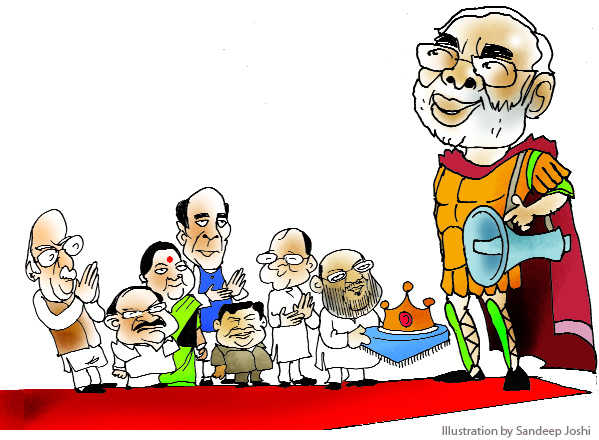
A very serious responsibility lies with the BJP''s senior leaders to impress upon the Prime Minister the virtues of Vajpayean moderation.
Harish Khare
The phenomenon is old. It was first brilliantly dissected more than two hundred years ago by Edmund Burke in his pitiless case for the prosecution against Warren Hastings. Burke had accused Hastings of not only abusing his office but also of hiring "a thousand tongues" who would justify and rationalise the misdemeanours and misdeeds of East India Company's overlord in India. Two hundred years later we find many more than thousand self-hired tongues competing with each other to serenade Narendra Modi on completing one year in office as the Prime Minister of India. The best and the brightest in the land have sought to explain away the contradictions in the Modi regime. Too much national breath has been wasted on counting our presumed blessings. Yet no one seems to be willing to tell it to the Prime Minister that the Modi moment has long passed.
The 2014 election victory was anchored in a particular moment and its peculiar mood of anxieties and angers. As a matter of fact every democratic mandate can be understood only in its specific context. And, a victory ipso facto changes the context, necessarily saddling the winner with the obligation to make the transition from the partisanship of the electoral battle to the exacting task of governing within the framework of the constitutional arrangements and political niceties. Modi has not yet made the transition. He remains reluctant to make the transition, just as he is unprepared to leave behind the bitterness of the past. Rather he seems to be only too eager to whet his knife every morning, and use it with considerable joy and satisfaction.
The fly in the Modi ointment is the Prime Minister’s very own political persona. This is a persona that has been forged-and, forged ruggedly and insistently — in a confrontational milieu, starting with the 2002 anti-Muslim massacre in Gujarat. A decade-long confrontation over the meaning and memories of that violence enabled him to add a distinct sang-froid to his political persona . He sparred, first, with Atal Behari Vajpayee, and later unsentimentally punched out his mentor and protector, Lal Krishna Advani; and, having tamed his own party, he waged a war against the Congress, its leadership and its government. This was a war recklessly waged but it did bring him a hefty electoral booty. His unbridled masculinity was endearing in 2014; a year later, it is distinctly unappetising.
Admittedly a ruling establishment is obliged to pursue what the great political theorist of our times, Antonio Gramsci, calls ‘the intellectual and moral leadership.’ The ruling group, especially in a democratic set-up, finds itself constrained to have to repeatedly secure consent and compliance from reluctant citizens. The modern ruler discovers the importance of controlling the direction and the content on the national discourse and conversation. Some regimes do it effectively and prosper, and those who fail to attend to this task with commensurate competence end up paying a price. The Modi regime seems to be over-determined not to repeat the mistake of its immediate predecessor government; the Prime Minister himself is most comfortable with wielding the largest megaphone.
Yet no national executive should be encouraged to make the mistake of confusing a capacity to manufacture noisy slogans and rhetoric with efficacious governance. Because Modi refuses to understand the distinction, he and his government have failed to revitalise the instruments of governance. It does not help that he remains mired in the working habits acquired during the Gujarat days. He seems to believe that he is entitled to the same unqualified adoration, obedience and compliance that was made available to him in Gandhinagar. But New Delhi is not Gandhinagar. The scene has changed; the man has not. Perhaps the blame lies on his experienced and senior ministerial colleagues as also on our self-styled intellectuals who should have pointed out to Modi that democracies elect prime ministers, not emperors.
An electoral mandate, as per the Constitution of India, only empowers a leader and his party to operationalise the Indian State, that too within the accepted constitutional practices and statutes. No leader, whatever be the shape of his parliamentary majority, can really think of himself exempted from the structure of reasonableness and restraint. No Prime Minister is above the political institutions and their established processes. Modi , too, has to discover that at least since 1977 the Indian political ethos and traditions now firmly frown upon any manifestation of overlordism.
In Modi’s case that precisely is the rub. Given his entrenched political persona, the Prime Minister has allowed himself to feel aggrieved that he is being subjected to the democratic norms of accountability. He believes he has single-handedly saved the nation from some kind of catastrophe. Unfortunately the self-hired spinmeisters as well as his own senior colleagues have fed this well-pronounced sense of megalomania. It is otherwise incomprehensible that any prime minister can allow himself to claim, that too on foreign soil, that before his accession to power the Indians felt ashamed of being born in this country. This is the tip of the iceberg of his self-obsession. It was no ordinary slip of the tongue. It is one thing for a political leader to rubbish his political rivals but it is rather jarring that Modi should have diminished and devalued even his own party’s prime ministerial icon, Atal Behari Vajpayee. That ministerial colleagues like Sushma Swaraj, Arun Jaitley and Venkaiah Naidu who were very much a part of the NDA government only ten years ago, should now keep quiet unprotestingly at this grand snub, is a deeply disquieting symptom.
Rather than settle down to the sobriety and solemnity of his office Modi appears to remain determinedly locked into the grammar of political confrontation. There is something addictive about this itch to fight, to take on each and every new dada in town, to return fire with fire. On the other hand, the principal opposition party, the Congress has already tended to its bruises and lacerations and is only too happy to provoke the prime minister into a daily brawl. The Prime Minister's combativeness has inevitably and unhealthily seeped into the government's working style and tone.
Consequently the country finds itself in a bind. The Indian state needs a working, effective, cogent and purposeful executive. But the prime minister's political persona and his preferred operative style distract from the task of serious governance. A year in office has produced enough daylight, to paraphrase, Walter Bagehot’s classic evocative expression, to “tarnish the magic.” But the prime minister remains in awe of his own tricks and his own tongue.
The polity is drifting towards very difficult days, reminiscent of the pre-Emergency era’s unthinking slide into a confrontation. A very serious responsibility lies with the BJP’s senior leaders to impress upon the Prime Minister the virtues of Vajpayean moderation. Immodesty and grandiloquence do not add up to political wisdom. No prime minister has the luxury of discarding altogether the traditions of political restraint, reasonableness and consensus. A deeply divided society cannot be governed in a divisive idiom by a divisive leader.


























